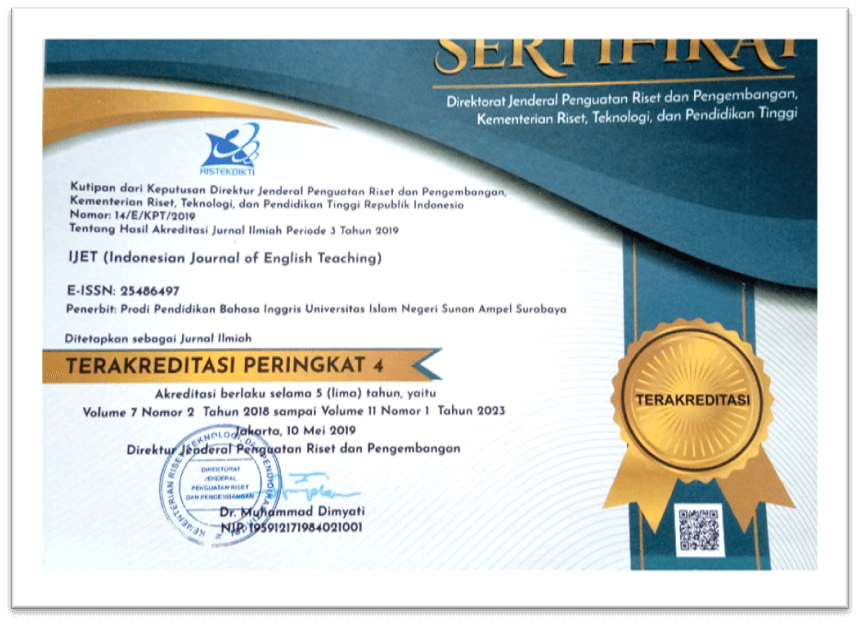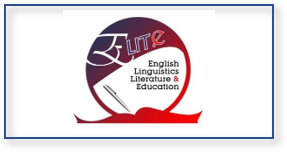Reading Strategies in Enhancing Students’ Reading Comprehension: Are They Still Relevant?
DOI:
https://doi.org/10.15642/ijet2.2023.12.1.57-72Keywords:
reading strategies, reading comprehension, reading skillAbstract
Abstract. As a result of recent technological advancements, reading in the modern period has altered in more ways than only how students interact with textbooks. However, this technological advancement really has a detrimental effect on students' reading skills. Students tend to be lazy to read books and prefer to read entertainment stuff on cell phones where the language used is mostly informal. Due to the informal language that is often used in social media and messaging apps, students were struggling with a variety of issues such as a lack of pleasure in reading, a lack of critical thinking ability, a bad reading style, and a lack of strategy, all of which contribute to their ultimate demotivation to read. This review aims to discuss theories and previous studies related to the impact of implementation of reading strategies towards students’ reading comprehension. The findings of this review show that students’ reading comprehension are positively affected by the use of reading strategies. Therefore, it is clear that reading strategies effectively contribute a prominent improvement towards the students’ reading comprehension.
Downloads
References
Ali, A. M., & Razali, A. B. (2019). A Review of Studies on Cognitive and Metacognitive Reading Strategies in Teaching Reading Comprehension for ESL/EFL Learners. English Language Teaching, 12(6), 94. https://doi.org/10.5539/elt.v12n6p94
Alowalid, A., Mujiyanto, J., Anggani Linggar Bharati, D., KhawariZmi Secondry School, A., & Khadous, Z. (2018). The Linguistic Factors That Affect Poor Reading Comprehension Among Libyan Students. EEJ, 8(2), 229–240. https://doi.org/10.15294/eej.v8i3.22466
Alzubi, A. A. F., & Singh, M. K. A. M. (2018). The Impact of Social Strategies through Smartphones on the Saudi Learners’ Socio-cultural Autonomy in EFL Reading Context. International Electronic Journal of Elementary Education, 11(1), 31–40. https://doi.org/10.26822/IEJEE.2018143958
Chan, M. L. (2014). Language Learning Strategies of Macao Nursing Students: An Embedded Mixed Methods Study. Asian Englishes, 16(3), 189–208. https://doi.org/10.1080/13488678.2014.919796
Dardjito, H. (2019). Students’ Metacognitive Reading Awareness and Academic English Reading Comprehension in EFL Context. International Journal of Instruction, 12(4), 611–624. https://doi.org/10.29333/iji.2019.12439a
Dzulfikri, D., & Saukah, A. (2017). Extensive Reading in Action: Voices from the Grounds. Journal of Education and Learning (EduLearn), 11(2), 111–119. https://doi.org/10.11591/edulearn.v11i2.5971
Febtisari, M., & Fitrawati. (2017). Improving Student’s Reading Comprehension of Descriptive Text by Using Collaborative Strategic Reading (CSR) to Eight Grade Students at Junior High School. Journal of English Language Teaching, 6(1), 334–340. https://doi.org/10.24036/jelt.v6i1.9663
Gilakjani, A. P., & Sabouri, N. B. (2016). How Can Students Improve Their Reading Comprehension Skill? Journal of Studies in Education, 6(2), 229. https://doi.org/10.5296/jse.v6i2.9201
Griffiths, C., & Parr, J. M. (2001). Language-learning Strategies: Theory and Perception. ELT Journal, 55(3), 247–254. https://doi.org/10.1093/elt/55.3.247
Hardan, A. A. (2013). Language Learning Strategies: A General Overview. Procedia - Social and Behavioral Sciences, 106, 1712–1726. https://doi.org/10.1016/j.sbspro.2013.12.194
Hardini, T. I., Puspita, R. D., & Yudhiantara, R. A. (2018). Learning Tasks Design in Improving Reading Comprehension Ability of Informational Text of 5th Grade in Indonesia: An Interactive-compensatory Model Use. Journal of Language Teaching and Research, 9(3), 555–560. https://doi.org/10.17507/jltr.0903.15
Hayashi, K. (1999). Reading Strategies and Extensive Reading in EFL Classes. RELC Journal, 30(2), 114–132. https://doi.org/10.1177/003368829903000207
Hayet, M. A., Nabi, N., & Ahmed, F. (2016). Using Reading Strategies for Developing EFL Reading Skills: A Study at Undergraduate Level in Bangladesh. The EDRC Journal of Learning and Teaching, 1(1), 71–91. http://www.edrc-jefler.org/index.php/the-edrc-journal-of-learning-and-teaching-print-version-issn-2411-3972
Ismail, S. A. M. M., Petras, Y. E., Mohamed, A. R., & Eng, L. S. (2015). Compensatory Reading among ESL Learners: A Reading Strategy Heuristic. English Language Teaching, 8(8), 46–55. https://doi.org/10.5539/elt.v8n8p46
Kasim, U., & Raisha, S. (2017). EFL Students’ Reading Comprehension Problems: Linguistic and Non-Linguistic Complexities. English Education Journal (EEJ), 8(3), 308–321. https://jurnal.unsyiah.ac.id/EEJ/article/viewFile/8920/7068
Latifa, N., & Manan, A. (2018). Teaching Narrative Text by Using Preview, Question, Read, State, and Test (PQRST) Technique. English Education Journal (EEJ), 9(2), 243–260. http://www.jurnal.unsyiah.ac.id/EEJ/article/download/11547/9262
Mahdavi, A., Taghizadeh, M. E., Isazadeh, S., Kazem Nia, K., Vojdani, S., Hosseini, S. N., & Falahati, M. (2015). Effectiveness of Education of Working Memory Strategies on Improvement of Reading Performance and Reduction of Depression in Children with Dyslexia. Mediterranean Journal of Social Sciences, 6(6), 66–71. https://doi.org/10.5901/mjss.2015.v6n6s6p66
Marzuki, A. G., Alim, N., & Wekke, I. S. (2018). Improving the Reading Comprehension through Cognitive Reading Strategies in Language Class of Coastal Area in Indonesia. IOP Conference Series: Earth and Environmental Science, 156(1). https://doi.org/10.1088/1755-1315/156/1/012050
Muhid, A., Amalia, E. R., Hilaliyah, H., Budiana, N., & Wajdi, M. B. N. (2020). The Effect of Metacognitive Strategies Implementation on Students’ Reading Comprehension Achievement. International Journal of Instruction, 13(2), 847–862. https://doi.org/10.29333/iji.2020.13257a
Naseri, M., & Zaferanieh, E. (2012). The Relationship between Reading Self-efficacy Beliefs, Reading Strategy Use and Reading Comprehension Level of Iranian EFL Learners. World Journal of Education, 2(2), 64–75. https://doi.org/10.5430/wje.v2n2p64
OECD. (2019). PISA 2018 Results (volume I): What Students Know and Can Do (Vol. 1). OECD. https://doi.org/10.1787/5f07c754-en.
Oxford, R. L. (1990). Language Learning Strategies: What Every Teacher Should Know (1st ed.). Boston: Heinle. https://www.pdfdrive.com/language-learning-strategies-what-every-teacher-should-know-e161545126.html
Oxford, R. L. (2003). Language Learning Styles and Strategies: An Overview. GALA, 1–25. https://www.researchgate.net/publication/254446824
Puspita, D. (2016). The Correlation between Language Learning Strategies and Reading Comprehension Achievements of The Eleventh Grade Students of SMA N 5 Palembang UIN Raden Fatah Palembang. Edukasi: Jurnal Pendidikan Dan Pengajaran, 3(2), 118–131. https://moraref.kemenag.go.id/documents/article/98745563641548674
Rahman, S. A. S. A., Yunos, D. R. M., Rahmat, N. H., Rahim, P. R. M. A., & Anuarudin, A. A. S. (2021). Coping with Reading Difficulty Using Socio-Affective Strategy. International Journal of Asian Social Science, 11(2), 129–136. https://doi.org/10.18488/journal.1.2021.112.129.136
Rastegar, M., Mehrabi Kermani, E., & Khabir, M. (2017). The Relationship between Metacognitive Reading Strategies Use and Reading Comprehension Achievement of EFL Learners. Open Journal of Modern Linguistics, 07(02), 65–74. https://doi.org/10.4236/ojml.2017.72006
Sari, M. H., Susetyo, Noermanzah, Wardhana, D. E. C., & Kusumaningsih, D. (2020). Understanding the Level of Students’ Reading Comprehension Ability. Universal Journal of Educational Research, 8(5), 1848–1855. https://doi.org/10.31219/osf.io/mr62t
Satriani, E. (2018). Reading Comprehension Difficulties Encountered by English Students of Universitas Islam Riau. J-SHMIC Journal of English for Academic, 5(2), 15–26. https://doi.org/10.25299/jshmic.2018.vol5(2).1885
Sharifi, S., & Rezaei, S. (2018). The Effectiveness of Working Memory Training on Reading Difficulties among Students with Reading Disorder. Iranian Journal of Learning and Memory, 1(1), 35–44. https://doi.org/10.22034/iepa.2018.77427
Siripitakchai, S., & Tiyawongsuwan, S. (2021). A Correlation Analysis of English Learning Strategies and English Reading Competencies of Aatthayomsueksa 1 Students under Nakhon Ratchasima Provincial Administration Organization in Thailand. REVISTA ESPACIOS, 42(9), 46–56. https://doi.org/10.48082/espacios-a21v42n09p04
Sua, M. R. (2021). Cognitive Strategies for Developing Students’ Reading Comprehension Skills using Short Stories. Revista de Estudios y Experiencias En Educación, 20(44), 233–253. https://doi.org/10.21703/0718-5162.v20.n43.2021.014
Suyitno, I. (2017). Cognitive Strategies Use in Reading Comprehension and its Contributions to Students’ Achievement. IAFOR Journal of Education, 5(3), 107–121. https://doi.org/10.22492/ije.5.3
Yang, X., Kuo, L. J., Ji, X., & McTigue, E. (2018). A Critical Examination of the Relationship among Research, Theory, and Practice: Technology and Reading Instruction. Computers and Education, 125, 62–73. https://doi.org/10.1016/j.compedu.2018.03.009
Zhou, X., & Zhao, Y. (2014). A Comparative Study of Reading Strategies used by Chinese English Majors. English Language Teaching, 7(3), 13–18. https://doi.org/10.5539/elt.v7n3p13
Zhussupova, R., & Kazbekova, M. (2016). Metacognitive Strategies as Points in Teaching Reading Comprehension. Procedia - Social and Behavioral Sciences, 228, 593–600. https://doi.org/10.1016/j.sbspro.2016.07.091










